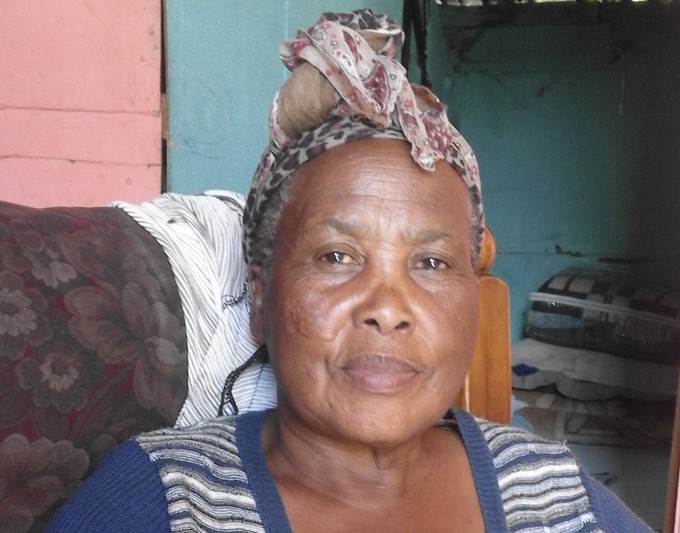
Madlomo Nxopho wants her disabled daughters to live with her in Khayelitsha. Photo: Thembela Ntongana
26 April 2016
All Khayelitsha mother Madlomo Nxopho, 66, wants, is a house where she can live with her disabled daughters, who are currently living in a home.
Nxopho lives in a three-roomed shack in Site C with two of her children. Two daughters, Zodwa, 32, and Nokubonga, 34, are severely disabled and live in a home in Stikland. A third child, also disabled, died in 2001.
Nxopho doesn’t know what their disabilities are called. “I was told that their bones are weak. When they were younger they could walk a little, but not for long. They are also mentally challenged and cannot do anything for themselves, especially the older one.”
At the back of her shack is a rubbish dump, which leaves her house with flies and rats.
“There are huge rats here. They eat everything – even us.”
When the daughters visit, she says, she has to stay up at night to protect them from the rats.
“I have to feed them, bathe them and change their nappies,” said Nxopho.
But all she wants is to have them permanently with her.
“I would do anything so I can have them stay with me but I have to accept that the way we live here is not safe, especially for them. It pains me every day to have to live far from them, and the place is far - I can’t visit them every day.
“If there was a fire and I was alone I would not know what do, because they need me to carry them and I can’t carry the two of them. They are safer there right now until I get a place that is safe. But it looks like I might die without staying with my children, and that kills me,” said Nxopho.
“I think about what will happen to them when I die, I can’t leave them in that place not knowing how they will be buried when they die.
“I have thought about taking poison so we can all die at the same time, if I get too sick and am still living in these conditions.”
She says she knows her daughters must be wondering why they are not staying with her.
“When I take them home for a visit it becomes difficult when they have to go back. They do not want to go, they cry and sometimes I wouldn’t want to take them back but reality would kick in and I would hire a car to take them there.
“When people ask me why I do not stay with them they do not understand the pain it causes me,” she said.
“I want them to feel my love before I die.”
Nxopho moved to Cape Town from the Eastern Cape in 1991 to be nearer to Red Cross Hospital where her children were being treated.
“I decided the best choice was to move to Cape Town.”
Her husband has moved back to the Eastern Cape and is not involved in his children’s welfare.
Nxopho says she went to the City of Cape Town’s housing office to register for housing but was referred from one office to another and to the councillor, without success.
Zalisile Mbali, spokesperson for Western Cape MEC for Human Settlements Bonginkosi Madikizela, said the department was “very sensitive” towards people with special needs. “However there is a set of criteria that must be adhered to.”
Mbali said in terms of provincial policy, to qualify for a subsidiary Nxopho would have to be on the waiting list “for a minimum of 10 years”. Subsidies were issued on a “first-come-first-serve” basis, he said. “When the funds are depleted, the applicant is required to reapply in the next financial year when new funds become available.”
He said it had not been established that she had registered with the City. But Nxopho said she had been to the City of Cape Town housing office more than once.
Talking to GroundUp, she fetched photographs she took during a birthday party for her daughters at the Stikland home a few years ago.
“Look at them, they are so beautiful. People always compliment them, you know, my children,” she said.